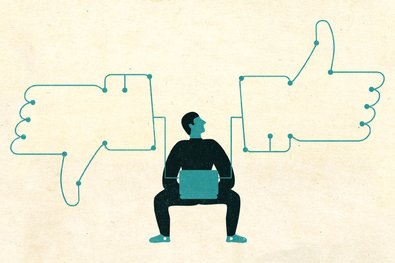
Is Digital Connectedness Good or Bad for People?
People of all ages are spending more and more time online. Does this digital trend improve lives or hurt them?
* of all ages = 모든 나이의; 모든 시대의/ connectedness = (사회에서의) 소속 관계[의식], 유대감; (의사와 환자 사이 등의) 결합 관계
 디지털의 추세는 사람들의 삶을 향상시키나요 아니면 해가 되나요?
디지털의 추세는 사람들의 삶을 향상시키나요 아니면 해가 되나요?
1. A Way to Explore and Build Relationships We Wouldn’t Otherwise Form
Today’s globalized success stories are wonderful because they are undeniably influenced by their local context.
2. Online Sharing and Selfies Erode the Value of Our Private Lives
The authenticity of these online activities is often more an attempt to curate a particular image than
an expression of a person's actual beliefs and convictions.
3. Online Activism Is Having a Positive Effect in the Real World
Our online interactions influence our offline behavior. The myth of clicktivism dismisses the powerful movements
that are taking place — on and offline.
4. The Constant Sharing Is Making Us Competitive and Depressed
The relationships we form are superficial at best, and the social comparison that these connections fosters
can be psychologically damaging.
5. Online Connections Can be Superficial, but the Examples of That Are Outliers
Many studies have shown that people who connect with others online are less likely to be socially isolated than
their peers who don’t.
Sample Essay
A Way to Explore and Build Relationships We Wouldn’t Otherwise Form
As social creatures, we seek out opportunities to connect with others. The internet is particularly effective in helping us do that.
As a child growing up in the United States with foreign parents, every summer we would visit my mother's family in Israel. There I would marvel at the artists on MTV Europe. And every four years, my Chilean father would hole up in our New Jersey basement to watch the Mundial on Univision — a cultural phenomena in other parts of the world, but unknown to our American neighbors.
Nowadays, music, sport and culture spread easily across the globe. Chinese artist Ai Weiwei is the darling of the art world. Shakira's fans go beyond Latin America. And even Black Friday sales are now a global phenomenon. It’s clear that the internet is having an impact on much more than our preference for music. For 18- to 24-year-olds, the heaviest social media users, it is the top source of news. For millennials, it is the biggest influence on voting behavior and the reason that they are more likely to give to global, as opposed to local, causes. The success of economy superpowers such as AirBnB, which has inspired millions to travel differently, points to a generation that is more open to connecting with strangers based on mutual interests and a willingness to trust people based on their online profiles.
But the internet, like all platforms, can be used for positive and negative interactions. We cringe with horror at hateful speech and people who leverage 140 character sound bites to further their anti-openness agenda. In the wake of the U.S. presidential election, many observers claim that social media has created “filter bubbles” that reinforce our views as opposed to opening us up to new ones.
As our world becomes more closely intertwined, we want to hold on to the elements of our identity that define where we come from. It can be sharing our home or showing pride in our local government. That is what makes today’s globalized success stories so wonderful — they are undeniably influenced by their local context.





![]() 디지털의 추세는 사람들의 삶을 향상시키나요 아니면 해가 되나요?
디지털의 추세는 사람들의 삶을 향상시키나요 아니면 해가 되나요?






